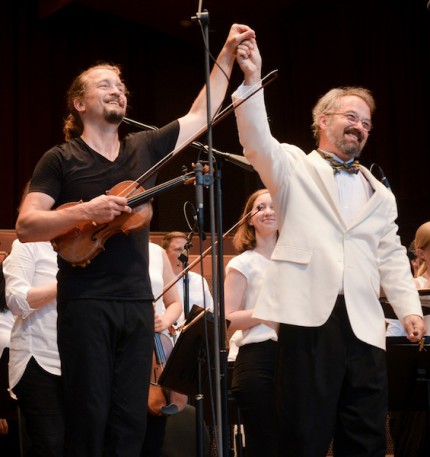Tetzlaff and Kalmar bring quirky engagement to Mendelssohn, Schubert

The afternoon rain abated and the sun peaked out right on schedule to allow for a comfortable evening Wednesday at the Pritzker Pavilion (leaky spots under Frank Gehry’s billowing steel sails apart).
The penultimate program of this summer’s Grant Park Music Festival offered a lineup of familiar Austro-German suspects–Mozart, Mendelssohn and Schubert–yet even in such well-trodden terrain Carlos Kalmar managed to flank the evening’s cornerstone concerto with two lesser-heard works.
The evening led off with the ballet music from Mozart’s opera Idomeneo, presented in its belated festival debut. Though the excerpts are structurally amorphous, the music is wholly delightful. With refined, nimble playing by the ensemble, Kalmar set a lively pace for the opening Chaconne, elegantly pointed the Passepied and Gavotte, and conveyed something of the opera seria’s ancient drama in the concluding Passacaille.
Festival favorite Christian Tetzlaff was the solo protagonist in Mendelssohn’s not unfamiliar Violin Concerto in E minor.
The grainy tone of his Peter Greiner instrument can make the German violinist’s performances an acquired taste for some. As always in his live concerts, Tetzlaff threw caution to the wind in his nervy playing, which produced some bristly passagework and patchy intonation, including a jarring moment in the final bars.
Yet even with the fitful lapses, Tetzlaff’s performance was fresh, committed and largely compelling, the soloist individual in his phrasing and quirky in his interpretive choices. The concerto was most successful in the Andante, with the soloist bringing a sweet tone and nostalgic ache to the music and exploring a wide range of dynamic nuance. If Mendelssohn’s charm was less consistently evident, the lithe, light-footed accompaniment by Kalmar and the orchestra proved gracious and wholly engaging.
The concert closed with Schubert’s Symphony No. 4, which proved the high point of the evening. It also served as a timely reminder of the freshness and vitality Kalmar reliably brings to music of the Austro-German repertoire.
The Fourth was subtitled “Tragic” by Schubert. To be sure, there is a decidedly somber cast to the slow introduction and the restless energy of the outer movements often borders on edgy agitation. Yet the shadows are mostly fleeting and the music less unremittingly bleak then Schubert’s “Unfinished” symphony.
From the opening measures, the refined tone and highly focused playing of the Grant Park strings were a pleasure to hear, and Kalmar had the full measure of this wonderful score–arguably the finest of Schubert’s less-frequently-played works in the genre.
The Andante was especially inspired, with Kalmar shaping Schubert’s long, dark-hued lines skillfully and adroitly balancing the drama and lyricism, with lovely contributions from the Grant Park winds.
In the final festival program of the season, Carlos Kalmar conducts soloists and the Grant Park Orchestra and Chorus in Berlioz’s Damnation of Faust 6:30 p.m. Friday and 7:30 p.m. Saturday at the Pritzker Pavilion. gpmf.com.
Posted in Uncategorized

